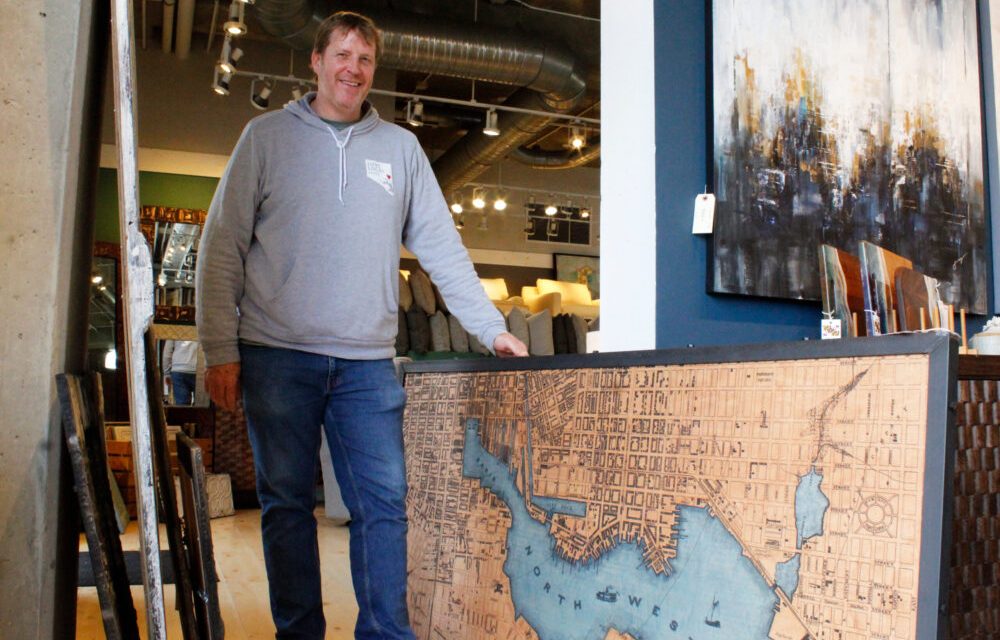BALTIMORE – The magnitude of the Francis Scott Key Bridge collapse and the closure of the Port of Baltimore is beginning to sink in for a variety of business owners in Baltimore, such as Nicholas Johnson from Su Casa Furniture in Fells Point.
Before the bridge’s collapse, Johnson wasn’t aware that the Port of Baltimore was a main hub for plywood. He worries how this may affect his furnishing business, but also how the port’s closure may impact Baltimore’s small business economy.
“My bigger concern is for how the ‘temporary’ adjustments to logistics may stick and become permanent,” Johnson, 39, said in an email. “Because of the timeframe for complete recovery, it is conceivable that many businesses that make arrangements to utilize NY, Philly, Norfolk, Wilmington and Richmond in the short term, may stick with it.”
Many other Baltimore businesses share his concerns. The March 26 collapse of the Key Bridge left six dead and left much of Baltimore’s port blocked for imports and exports. Some 51,000 people rely on the port, either directly or indirectly, for their jobs. Because of this threat to the economy, Governor Wes Moore has approved $60 million in temporary assistance to workers and businesses.
Some high-profile companies immediately shifted gears: first Royal Caribbean International moved its Vision of the Seas ship to sail from the port in Norfolk, Virginia. Then, CSX Corp., a major freight rail company, decided to add a new train route to bring supplies from Baltimore to New York. The U.S. Small Business Administration said more than 1,000 businesses in the Baltimore area have applied for emergency loans following the bridge collapse.
For trucking companies based in the city, the port closure resulted in major shifts in their operations and forced some drivers out of work. Universal Intermodal Services Inc.’s Dundalk location currently has at least 12 truckers out of work, according to fleet manager, RJ Martin.
“It’s really screwed up the trucking market in this whole area as guys are no longer working in this area,” Martin said. “They’re having to go somewhere else or just be out of work and try and collect unemployment – which not everyone will be approved for.”
Martin said that mass cancellations result in rerouted shipments to ports in Virginia and New Jersey. Many customers decided to cancel trucking orders with Universal’s Baltimore facility and are instead scheduling with Universal’s other locations or other carriers closer to the new drop-off locations, Martin said. He said out of 50 orders, about 30 have been canceled and of the remaining 20, about 10 were rerouted.
About 10 truckers from Universal have gone down to Norfolk to register with the port there to pick up rerouted shipments, according to Martin. He said other Baltimore-based truckers also have to register in Norfolk to pick up loads. This additional clearance has added five to six hours to many of the truckers’ days.
Martin is hopeful that once the Baltimore channel is cleared and the port reopens, operations for Baltimore shipping companies will return to normal. The U.S. Army Corps of Engineers said it hopes to have the Port of Baltimore partially reopened by the end of April and fully open by May.
Other businesses don’t face such a severe economic impact, but they consider the loss of the Key Bridge as an important symbolic moment for the community. For Brandy Teresi, 48, co-owner of Robbie’s Bar and Grill in Sparrows Point, the Key Bridge was “a part of your identity and who you are as an individual, which is weird because it’s just a bridge.”
The only small immediate impact for Robbie’s Bar and Grill has been rerouted deliveries. One quirk: the supplier of the bar’s CO2 tanks, which pump the beer taps and soda machines, needs to go around the city because regulations don’t permit the tanks in the Harbor Tunnel on Interstate 895, Teresi said.
Other businesses across the city are still navigating the uncertainty that comes with the collapse. Canton-based Mama’s on the Half Shell has not experienced any direct economic impacts, but some customers from Anne Arundel County have a longer drive to the restaurant, said Maurico Guevara, a veteran employee at Mama’s. The restaurant planned to hold a fundraiser on April 10 and donate a portion of their profits to victims of the collapse, he said.
Megan Gardner, marketing director for the restaurant group that owns Mama’s, doesn’t predict any problems with food shipments since they obtain their food from local suppliers. The biggest impact is emotional.
“Feeling that communal heartache is more of how we felt,” Gardner said.





Recent Comments